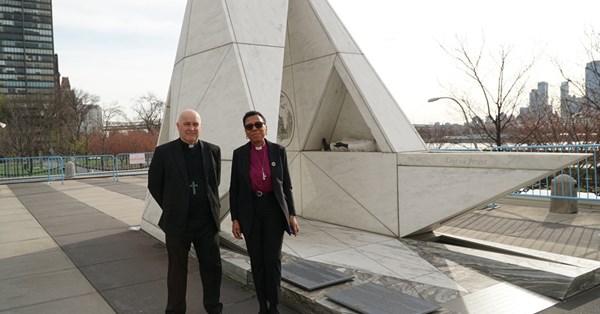THE Church of England has been “humbled by the truth” of its implication in the transatlantic slave trade, the Archbishop of York told a UN forum this week; but he said that scripture and the example of Christ “give us hope for our world and hope that we can do better”.
Archbishop Cottrell was speaking in New York on Monday, during a session of the United Nations’ Permanent Forum on People of African Descent, which was co-hosted by the Anglican Communion.
The Archbishop began his address with a Ghanaian proverb, which he had heard during a visit to Cape Coast Castle, where enslaved people were held before being transported across the Atlantic (Comment, 24 February 2023).
“Until the lion has told his story, the hunter will always be a hero,” the proverb says, and Archbishop Cottrell told the gathering that he was there “to share the story of how this hunter has been humbled”.
“We in the Church of England have been humbled by the truth,” he said, referring to research which showed that Queen Anne’s Bounty, which was later amalgamated into the funds now managed by the Church Commissioners, had been invested in the South Sea Company.
In 2023, the Church Commissioners, which had instigated the research, announced their intention to launch a £100-million “impact investment fund” to invest in communities affected by the legacy of the slave trade (News, 10 January 2023).
Some academics have questioned whether the Church profited from its investments in the South Sea Company, arguing that efforts were made to avoid economic exposure to transatlantic chattel slavery (Comment, 22 March 2024).
“This work that we are engaged in is both deeply uncomfortable and deeply hopeful,” Archbishop Cottrell said on Monday.
“It is deeply uncomfortable because I am here as a leader in the church that was involved in a most shameful, scandalous abuse and oppression of fellow human beings.
“It is deeply uncomfortable because slavery still exists in our world today and it is deeply uncomfortable because the legacy of transatlantic chattel enslavement still blights many people and many communities.
“But sisters and brothers, it is also deeply hopeful, because the scriptures and the example of Christ and those narratives of liberation that inspired enslaved people, inspire me and give us hope for our world and hope that we can do better.”
Continuing the theme of Ghanian proverb, Archbishop Cottrell said that, “in a way, we the hunters, we the slave traders, we the twisters of Christian tradition, have also been set free by this truth.
“It gives us a narrative about what it is to be human, how we belong to one another, and how we inhabit this world together; the very values that are at the heart of the United Nations.”
These values, Archbishop Cottrell warned, are “at peril in our world today”, and he called for them to be reaffirmed.
The Bishop of Croydon, Dr Rosemarie Mallett, was part of a panel last year which expressed hope that other investors who had been involved historically in the slave trade could be attracted to adopt the Commissioners’ approach (4 March 2024).
Dr Mallett was also in New York on Monday for the UN forum, and spoke on a panel alongside representatives from Barbados, Jamaica, Ghana, and Kenya.
“The dialogue at the UN represents a new phase of engagement and commitment from the Church of England, one rooted in the hope that — even after deep historical failure — reconciliation and justice are still possible,” she said.
On Wednesday, Archbishop Cottrell and Dr Mallett joined a prayer vigil at the Ark of the Return: a monument at the UN headquarters which honours victims of the slave trade.

















